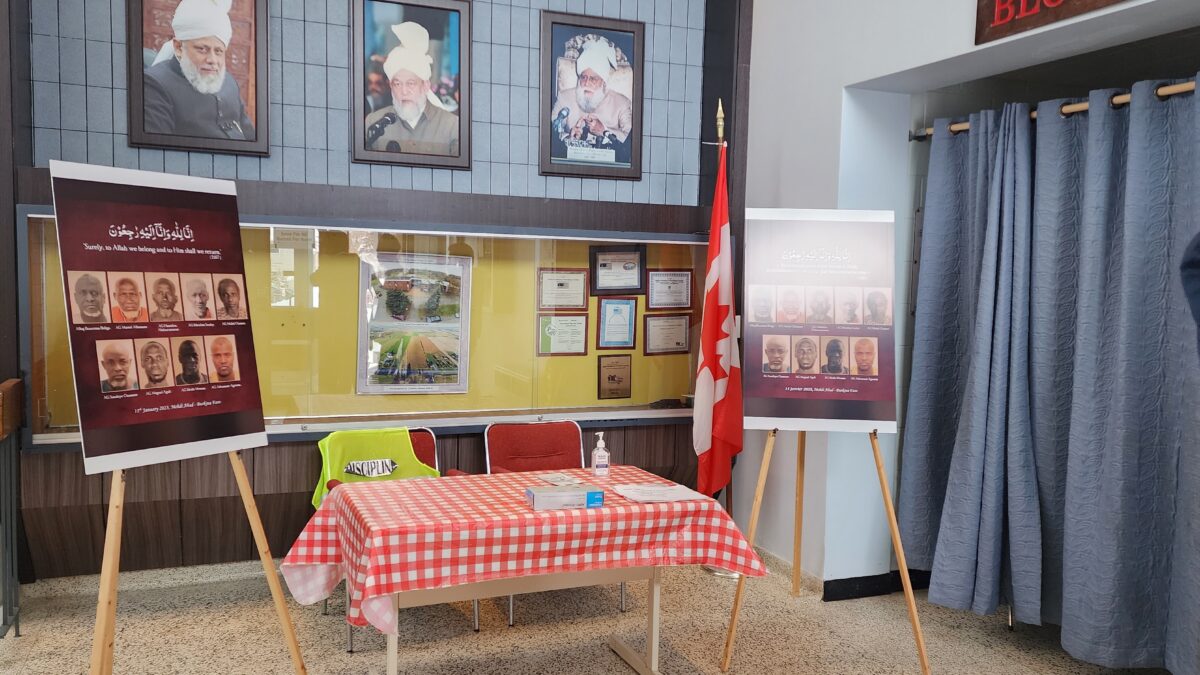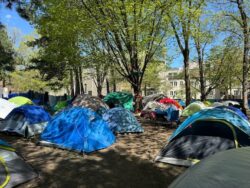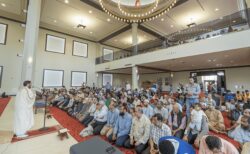When members of the Ahmadiyya Muslim Community walked into Baitun Naseer Mosque in east-end Ottawa on Jan. 20, they were met with a sombre display: two identical poster boards, each presenting pictures of nine men, with the words “Surely to Allah we belong and to Him shall we return” inscribed above them.
The nine Ahmadiyya Muslims were victims of a horrific terrorist attack on Jan. 11 in the West African nation of Burkina Faso. News of the attack was disseminated quickly throughout the global community of about 15 million Ahmadiyya Muslim people, and the tragedy is being mourned around the world — including in Canada, which has more than 25,000 members.
Farhan Iqbal, an Imam at Baitun Naseer Mosque, led the Jan. 20 vigil to remember the nine victims. He delivered a sermon in which he spoke about the integrity of the men who were martyred because of their faith.
“They were given the choice to … deny their faith and live, or keep their faith and die. And all nine of them chose their faith over their lives,” Iqbal said.
‘They were given the choice to … deny their faith and live, or keep their faith and die. And all nine of them chose their faith over their lives.’
— Imam Farhan Iqbal, Baitun Naseer Mosque, Ottawa
According to a press release from the Ahmadiyya Muslim Community, terrorists entered a mosque in an “Ahmadi-Muslim majority village” and forced nine older men to exit the mosque, including Imam Alhaj Boureima Bidiga.
After all nine men refused to renounce their faith, they were shot dead by the terrorists.
Tragically, the Burkina Faso attack is not an isolated incident for members of the international Ahmadiyya Muslim Community. They have been targeted and persecuted for their faith, including in Pakistan, the country with the largest population of adherents in the world.
Iqbal, who has spent much of his career spreading the teachings of Islam and dispelling myths about the Muslim community through a Youtube channel and two books, said that the Ahmadiyya Muslim Community is extremely tight-knit, not only in Canada, but globally.
“The way our community is, we feel like we’re a family, all across the world. When anything like this happens in any part of the world, it hurts all of us.”
There are more than 100 chapters of the Ahmadiyya Muslim Community, from British Columbia to Newfoundland and Labrador.
The biggest Canadian centre is in the Toronto suburb of Vaughan. However, Faheem Affan, a spokesperson and director of The Parliamentary Friends of the Ahmadiyya Muslim Jama`at, said there’s a substantial population of community members in the national capital region.
“I don’t have an exact number, but I would say there are between 500-600 families in the community here,” Affan said.
Affan added that two of the families that are part of the Ahmadiyya Muslim Community in the national capital area are originally from Burkina Faso.
Violence against the Ahmadiyya Muslim Community and other sects of Islam in Western Africa is not a new phenomenon.
Dr. Khalid Medani, an associate professor at McGill University’s Institute of Islamic Studies, said those who belong to the Ahmadiyya Muslim Community hold beliefs that are considered blasphemous by other, more mainstream sects of Islam. Among them is the belief that Jesus Christ survived the crucifixion.
‘We are a peaceful community and our community members have been killed around the globe . . . just because of our faith. And this should not be happening. We are very glad to be in Canada, where everyone has freedom of religion.’
— Faheem Affan, a spokesperson and director, The Parliamentary Friends of the Ahmadiyya Muslim Jama`at
“The majority of Muslims . . . absolutely believe in Jesus Christ as a prophet, but not in the very important aspect of the resurrection,” said Medani. “They believe that that is heretical, to say that a prophet returns from the dead, because all of the prophets are supposed to be human.”
These ideological divides often lay the groundwork for violence, and in recent years Burkina Faso has seen a huge spike in the number of “very orthodox militants,” Medani said.
“They have been growing in number and violence in West Africa since at least 2014, and since 2018 Burkina Faso has witnessed a huge number of attacks against people that they (militant groups) feel are not true Muslims.”
Medani explained that back-to-back military coups in the space of a year have led to a security vacuum and worsening situation in Burkina Faso, which has allowed militant groups to operate in the country without much fear of being prosecuted.
When speaking about his own reaction to the tragedy, Faheem Affan said he was feeling the same grief and frustration felt by members of the Ahmadiyya Muslim Community around world.
“We are a peaceful community and our community members have been killed around the globe … just because of our faith. And this should not be happening,” Affan said.
“We are very glad to be in Canada, where everyone has freedom of religion.”




